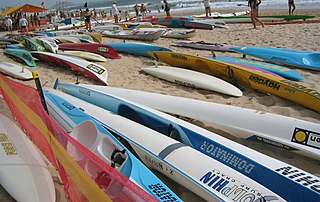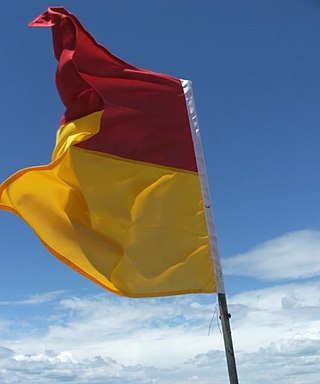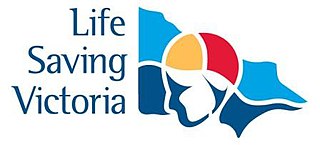
Surf lifesaving is a multifaceted social movement that comprises key aspects of voluntary lifeguard services and competitive surf sport. Originating in early 20th century Australia, the movement has expanded globally to other countries, including New Zealand, Ireland, South Africa, and the United Kingdom. Surf lifesavers in Australia are colloquially known as "Clubbies".

A lifeguard is a rescuer who supervises the safety and rescue of swimmers, surfers, and other water sports participants such as in a swimming pool, water park, beach, spa, river and lake. Lifeguards are trained in swimming and CPR/AED first aid, certified in water rescue using a variety of aids and equipment depending on requirements of their particular venue. In some areas, lifeguards are part of the emergency services system to incidents and in some communities, lifeguards may function as the primary EMS provider.

The German Life Saving Association is a relief organization for life saving in Germany. The DLRG is the largest voluntary lifesaving organization in the world.

Huntington State Beach is a protected beach in Southern California, located in the City of Huntington Beach in Orange County. It extends 2 miles (3.2 km) from Newport Beach north to Beach Boulevard, where the Huntington City Beach begins. The 121-acre (49 ha) park was established in 1942.
Surf Life Saving Northern Region is the largest of four regions that make up Surf Life Saving New Zealand. As of the 2021/2022 season, it is made up of 18 clubs that look after 22 patrol locations from Ahipara to Raglan on the West Coast and from Whangārei Heads to Takapuna on the East Coast.

Surf Life Saving New Zealand (SLSNZ) is the national association representing 74 Surf Life Saving Clubs in New Zealand. The organisation's motto is 'In it for Life'. This refers to both the long relationship many members have with the organisation, as well as to the organisation's purpose of preventing drowning and injury, thereby saving lives.

Piha Surf Life Saving Club is a surf lifesaving club for the southern section of Piha, on the west coast of Auckland, New Zealand, some 45 km from the Auckland City centre. The patrol was featured in the TVNZ reality show Piha Rescue.

The International Life Saving Federation (ILS) is an organisation for drowning prevention, water safety, lifesaving and lifesaving sports.

The United States Lifesaving Association is a nonprofit professional association of beach lifeguards and open water rescuers in the United States.

Surf Life Saving Australia (SLSA) is an Australian not-for-profit community organisation that promotes water safety and provides surf rescue services.

Lifesaving is the act involving rescue, resuscitation and first aid. It often refers to water safety and aquatic rescue; however, it could include ice rescue, flood and river rescue, swimming pool rescue and other emergency medical services. Lifesaving also refers to sport where lifesavers compete based on skills, technique, speed and teamwork. Lifesaving activities specialized in oceanic environment is called surf lifesaving or coastal lifesaving.

Bondi Rescue is an Australian factual television program which is broadcast on Network 10. The program follows the daily lives and routines of the Waverley Council professional lifeguards who patrol Bondi Beach.
National Water Life Saving Association (NWLSA), also known as Chinese Taipei Water Life Saving Association (CTWLSA), is the major lifesaving organization in Taiwan. The organization's members are mainly volunteer lifesavers, police officers, firefighters and civilians who are enthusiastic about water sports, water safety awareness and water rescue events.

Life Saving Victoria is an Australian life saving organisation formed in 2002 from a merger of the Victorian Branch of the Royal Life Saving Society Australia and Surf Life Saving Victoria. Life Saving Victoria works to prevent drownings and other water related deaths and injuries in Victoria. Life Saving Victoria teaches local communities in Victoria about water safety, swimming and resuscitation. It also provides surf life saving services and patrols for beaches across the state. Life Saving Victoria is an emergency support agency to Victoria Police for water based emergencies.

Karioitahi Beach is a black sand beach located in the southwest of the Auckland region, on the west coast of New Zealand's North Island. The nearest major town is Waiuku, about 8 km inland.
Water safety refers to the procedures, precautions and policies associated with safety in, on, and around bodies of water, where there is a risk of injury or drowning. It has applications in several occupations, sports and recreational activities.
Lifeguards Without Borders is an international non-profit organization of volunteer lifeguards and health care professionals who promote training, program development, and research.

Lifesaving South Africa (LSA) is a South African organisation that promotes water safety and provides surf rescue services. LSA is a founding member organisation of the International Life Saving Federation, and a member of Royal Life Saving Society. It is recognised by DSAC and SASCOC.
Simon Lewis is an Australian lifeguard and volunteer surf lifesaver. Once the former St Kilda Lifesaving Club Captain, he is the only Australian lifeguard to have worked both major migration routes in Europe. He first became part of a team of six on lesvos Greece with International Surf Lifesaving Association (ISLA). Since joining the mission with ISLA, Lewis has completed seven humanitarian rescue missions with six NGOs saving the lives of over 1,900 African and Syrian refugees as they attempted to cross the dangerous waters of the Mediterranean Sea to Greece and Italy. As well as being the first Australian to become the head of mission on the central migration route for the German NGO Mission Lifeline, Lewis participated in the Asylum Seeker Resource Centre (ASRC) yearly telethon which raised over $800,000 for the organisation to continue to help those in dire need.
The Freshwater Surf Life Saving Club, established in 1908, is located at Freshwater Beach in Australia. It has become a large volunteer organization with strong community bonds. The club was founded by a push from government to foster safer beach practices. It is a part of Surf Life Saving Australia, a not-for-profit organization committed to keeping the beach safe for patrons and providing beach rescue services. A visit to the club from United States' surfer, Duke Kahanamoku, in 1914 helped initiate the sport of surfing in Australia.













